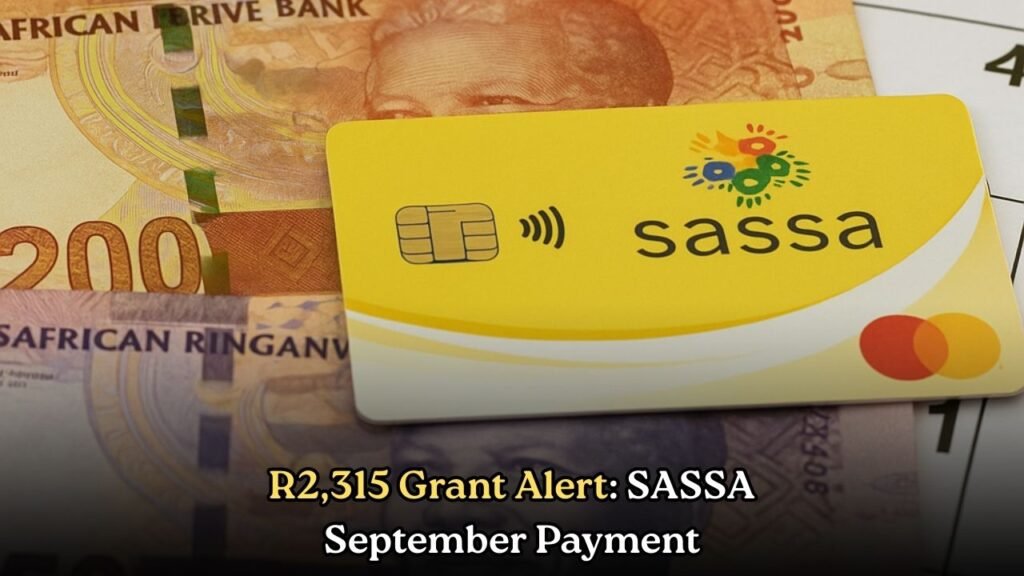Find Out if You’re Eligible: SASSA Announces September 2025 Payouts of R2,315, R560, & R1,250: South Africans are eagerly awaiting the news regarding their social grant payouts, and the latest announcement from the South African Social Security Agency (SASSA) has brought some clarity. In September 2025, SASSA will be distributing grants of R2,315, R560, and R1,250 to eligible recipients. This significant move aims to provide financial relief to millions across the nation. With the increasing cost of living and economic challenges, these grants are a vital lifeline for many families. Understanding your eligibility can make a significant difference in managing your monthly budget and ensuring that you receive the support you are entitled to. Let’s explore who qualifies for these payouts and how you can ensure you’re on the list to receive them.

SASSA’s September 2025 Payouts Explained: Understanding the R2,315 Grant
The SASSA grant of R2,315 is primarily aimed at providing financial support to elderly citizens who have reached the age of 60 and above. This grant is part of the Old Age Pension scheme, which plays a crucial role in supporting senior citizens who often rely on this income for basic necessities. In South Africa, where a significant portion of the elderly population lives below the poverty line, this grant helps to alleviate some of the financial burdens. To qualify for the R2,315 payout, applicants must meet certain criteria set by SASSA, including income thresholds and residency requirements. It’s essential for potential recipients to ensure their details are up to date with SASSA, as any discrepancies can lead to delays or denials of their grant applications. The Old Age Pension not only provides financial relief but also supports the dignity and well-being of the elderly, allowing them to live with some measure of independence and security.
Eligibility Criteria for SASSA’s R560 Grant: Are You Qualified?
The R560 grant is specifically designed to assist vulnerable children in South Africa, ensuring that they have access to basic needs such as food, clothing, and education. This grant, often referred to as the Child Support Grant, targets families in need, providing critical support to those who are raising children under challenging circumstances. To qualify for this grant, the primary caregiver must be a South African citizen or permanent resident, and the child must be under the age of 18. Additionally, the household income must fall below a certain threshold, which SASSA periodically reviews to reflect economic conditions. The Child Support Grant is a cornerstone of South Africa’s social assistance programs, addressing child poverty and helping to reduce inequality by giving children a better start in life. By applying for this grant, caregivers can ensure that their children receive the necessary resources to thrive, both academically and socially.
Disability and Dependency: Unpacking the R1,250 SASSA Grant
The R1,250 grant is designated for individuals living with disabilities, providing them with financial assistance to address the unique challenges they face. Known as the Disability Grant, this payout is crucial for those who are unable to work due to physical or mental disabilities. To qualify, applicants must undergo a medical assessment by a SASSA-approved doctor to confirm the disability. Additionally, the applicant must be a South African citizen or permanent resident, and their income and assets must fall below specified limits. This grant aims to empower people with disabilities, ensuring they have the means to cover essential living expenses, medical care, and rehabilitation services. For many, this financial support is instrumental in improving their quality of life, promoting inclusion, and helping them achieve greater independence.
How to Apply for SASSA Grants: Ensuring You Receive Your September 2025 Payout
Applying for SASSA grants can seem daunting, but understanding the process can ensure you receive your entitled payouts. First, gather all necessary documentation, including your South African ID, proof of residence, and any relevant medical or financial records. For those applying for child or disability grants, additional documentation regarding the child’s birth or medical assessments will be required. Once your documents are in order, visit your nearest SASSA office to submit your application. It’s crucial to ensure that all information provided is accurate and up-to-date to avoid processing delays. SASSA also offers online application options for certain grants, streamlining the process for tech-savvy applicants. After submission, your application will be reviewed, and if approved, you will be notified of your grant status and payment details. Staying informed and proactive about your application status can help you secure the financial support you need without unnecessary hassles.




